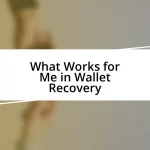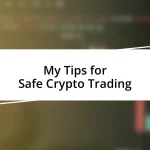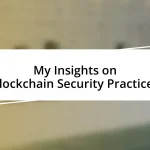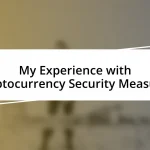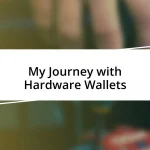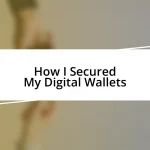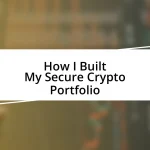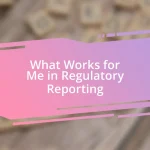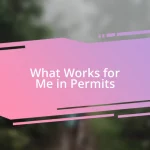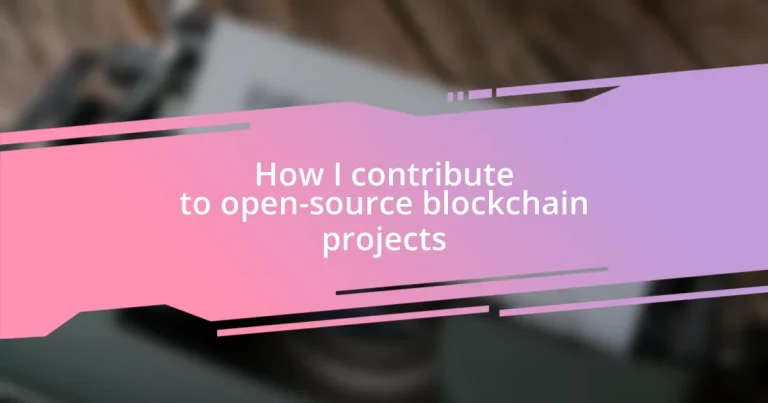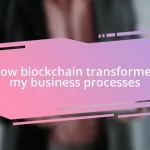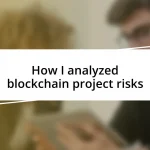Key takeaways:
- Open-source blockchain projects foster collaboration, transparency, and community engagement, allowing individuals to contribute to and inspect code freely.
- Participating in these projects enhances personal and professional development through skill improvement, community connections, and tangible portfolio building.
- Successful collaboration relies on clear communication, active feedback exchange, and respect for team dynamics and deadlines.
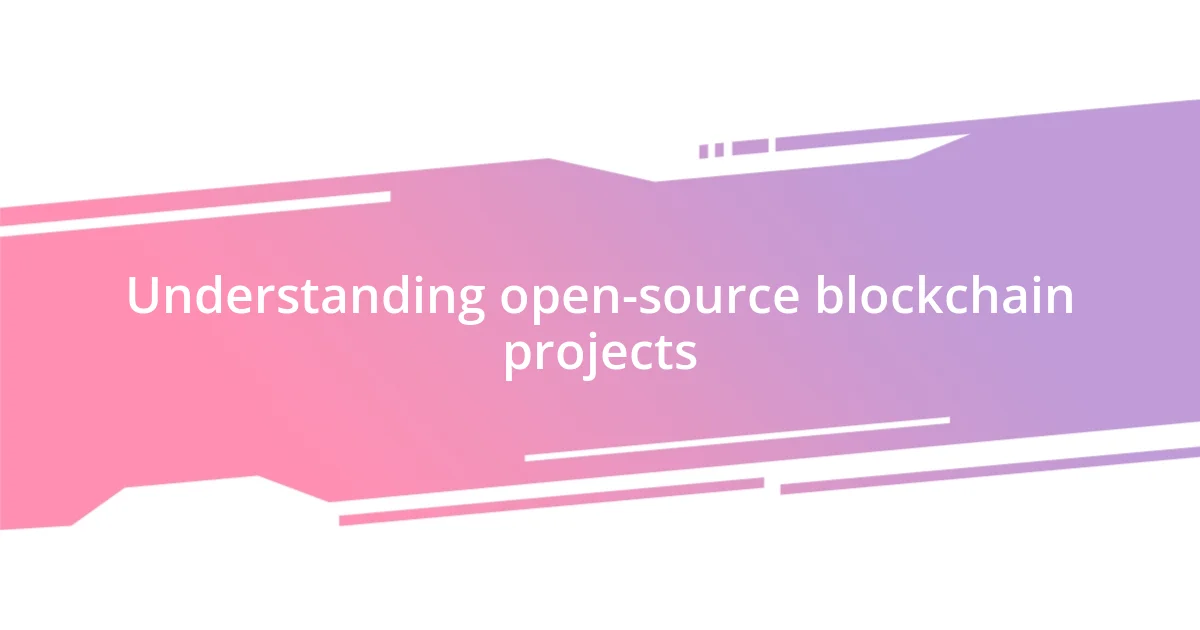
Understanding open-source blockchain projects
Open-source blockchain projects are collaborative efforts where developers from around the globe contribute to software that anyone can inspect, modify, and enhance. I remember the first time I stumbled upon a project on GitHub; it felt exhilarating to think that my small contribution could impact a technology that might revolutionize finance. This sense of community engagement is deeply rewarding; it reminds us that we’re all part of something bigger.
What’s fascinating about these projects is how they foster transparency and trust. Unlike closed-source solutions, open-source development allows anyone to scrutinize the code, ensuring fairness and security. Can you imagine the empowerment that comes from knowing your work isn’t hidden away? I often think about the trust issues that arise in proprietary systems; embracing open-source can feel like a breath of fresh air.
Moreover, participating in open-source blockchain projects often leads to unexpected learning experiences. I’ve engaged with developers from different backgrounds and skill levels, each bringing unique perspectives. How has collaboration shaped your knowledge or skills? It’s those diverse interactions that not only expand our understanding but also create a sense of belonging in a community united by shared goals.
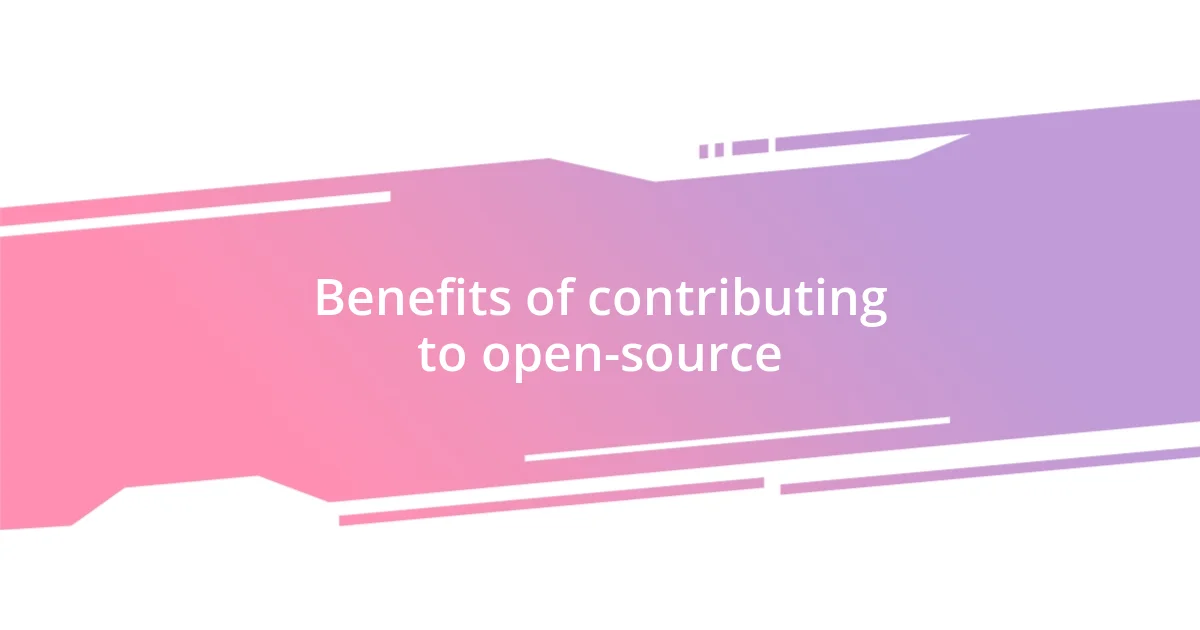
Benefits of contributing to open-source
Contributing to open-source projects has opened up immense opportunities for personal growth and professional development in my journey. I’ve gained hands-on experience that often translates into real-world skills, which have proven invaluable in my career. I remember the thrill of solving complex bugs in a project; it felt like solving a thrilling puzzle that taught me more than any lecture ever could.
- Community Building: You forge valuable connections with like-minded individuals who share your passion for innovation.
- Skill Enhancement: Engaging with real projects improves coding and problem-solving skills, well beyond the classroom experience.
- Portfolio Boost: Contributions provide tangible proof of your abilities, showcasing your work to potential employers.
- Feedback Loop: Receiving input from experienced developers helps refine your skills and understanding of best practices.
- Empowerment: There’s a profound sense of ownership that comes from seeing your contributions utilized in a project that could benefit many.
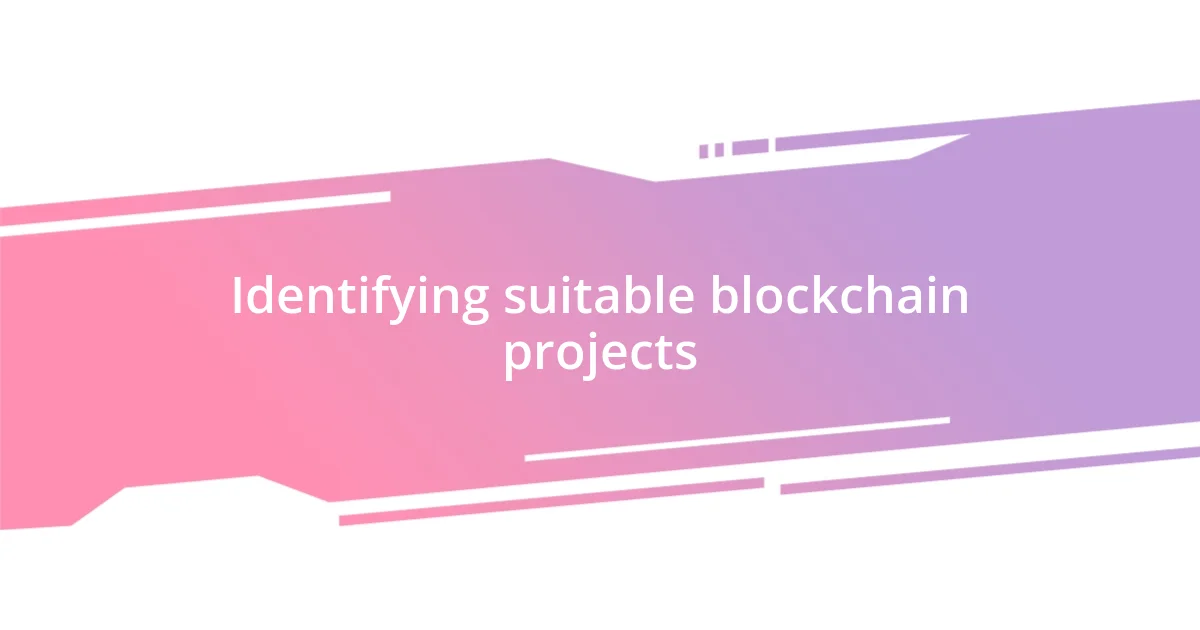
Identifying suitable blockchain projects
Identifying suitable blockchain projects requires both introspection and research. I often start by reflecting on my interests and skills; this helps me discover projects that resonate with my passions. For instance, when I found a project focusing on decentralized finance, it felt like a perfect alignment with my background in finance, inspiring me to contribute meaningfully.
Next, I actively utilize various platforms such as GitHub, Discord, and dedicated forums. These spaces are buzzing with activity, where I can gauge the project’s community dynamics, the enthusiasm of contributors, and the clarity of documentation. I vividly recall my excitement when I encountered a well-structured project with engaged maintainers; it made me feel confident that I could seamlessly integrate into the team.
Another crucial aspect is evaluating the project’s impact and longevity. I dive into its vision and roadmap to see if it aligns with future trends and societal needs. After joining a project that aimed to improve supply chain transparency, I realized the profound change technology could bring to vital industries. Have you ever found yourself analyzing a project’s potential to change lives? It’s a rewarding exercise that fuels my motivation to contribute.
| Criteria | Description |
|---|---|
| Community Engagement | Look for active discussions and a welcoming atmosphere. |
| Documentation Quality | Check for comprehensive guides and tutorial resources. |
| Project Vision | Assess the goals and long-term vision for sustainability. |
| Technology Stack | Evaluate the tech used—ensure it matches your skills and interests. |
| Impact Potential | Consider the real-world applications and benefits of the project. |
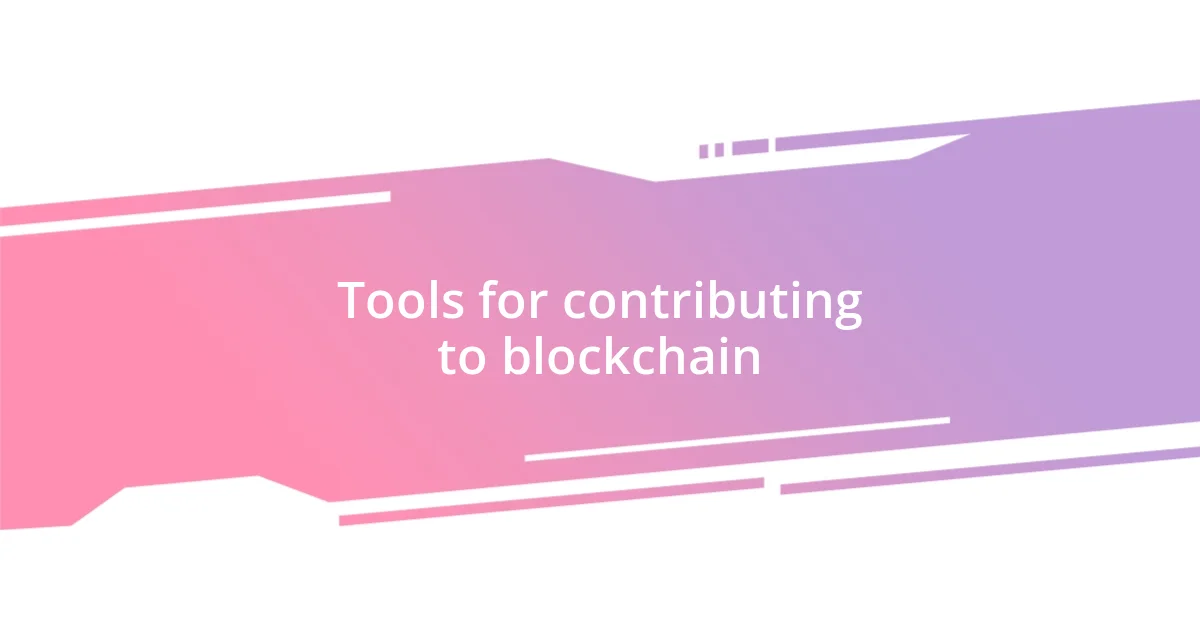
Tools for contributing to blockchain
When it comes to the tools for contributing to blockchain, I find that having the right software can make all the difference. For instance, GitHub is my go-to platform for version control and collaboration. I vividly remember my early days; I felt a rush of excitement the first time I pushed a commit to a repository. It’s empowering to see my code become part of something larger, and GitHub’s branching features helped me experiment with different ideas without the fear of breaking anything.
Additionally, having a good development environment is crucial. I typically use Visual Studio Code, which offers excellent extensions for blockchain development, like Solidity plugins. The first time I integrated smart contracts within my project, the joy was palpable—it felt like I was building the future right in front of me. Have you ever experienced that electric moment when your code runs successfully? It keeps me motivated to dive deeper and learn more.
Moreover, don’t overlook the value of communication tools like Discord and Slack. They create a space where I can interact directly with other developers, ask questions, and share insights in real-time. I still remember participating in a live coding session where the collective knowledge we shared was breathtaking. There’s something uniquely powerful about collaborating with others in the moment. What tools have you found indispensable in your contributions?
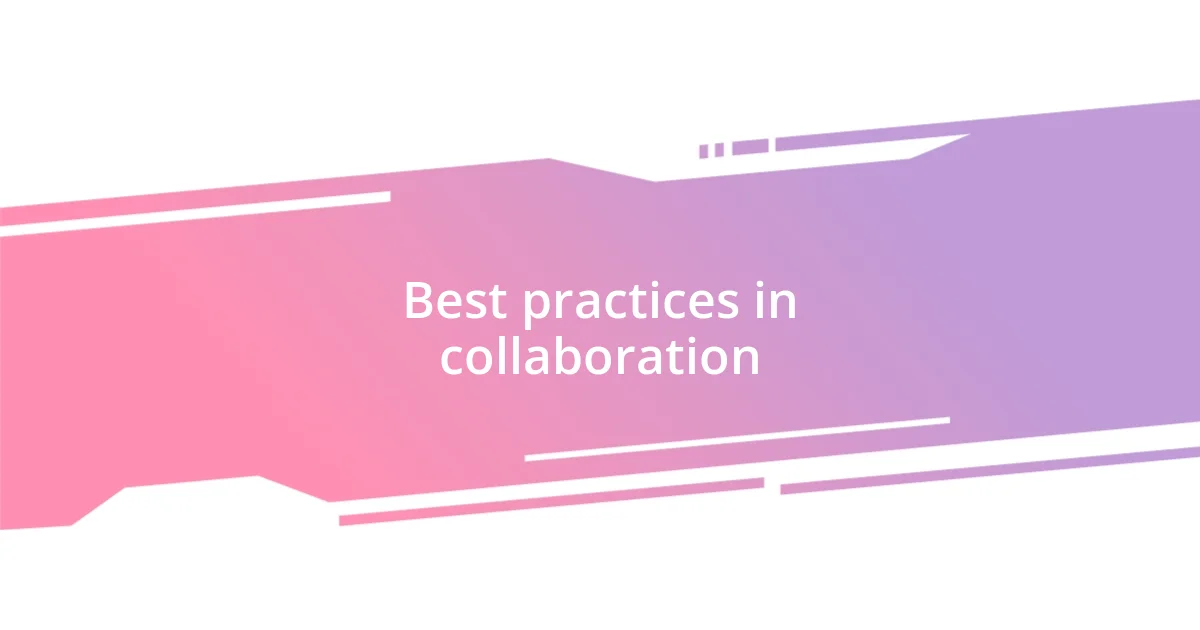
Best practices in collaboration
Collaboration in open-source blockchain projects thrives on clear communication. I’ve learned that being transparent about my skills, limitations, and availability fosters trust among team members. I vividly recall joining a new project where I openly shared my previous experiences and what I hoped to achieve. This openness not only helped me build rapport but also invited constructive feedback, creating a more cohesive team environment. Have you ever considered how your willingness to communicate can influence the dynamics of a group?
Another best practice I embrace is actively seeking and providing feedback. After submitting my first pull request, I was eager for suggestions. The resulting dialogue, where teammates offered their perspectives, sparked a level of growth I hadn’t anticipated. It’s fascinating to realize that constructive criticism can pave the way for personal development and better project outcomes. Rocking the feedback loop can truly elevate the quality of contributions in an open-source setting.
Lastly, being mindful of everyone’s time is essential. I strive to respect deadlines and commitments, ensuring that my contributions are timely and aligned with team goals. During a recent project sprint, I made it a point to clarify my priorities upfront, which helped the team allocate tasks efficiently. How do you navigate the delicate balance of being productive while being considerate of others? I’ve found that open discussions about pacing can help everyone stay on the same page and enhance overall collaboration.
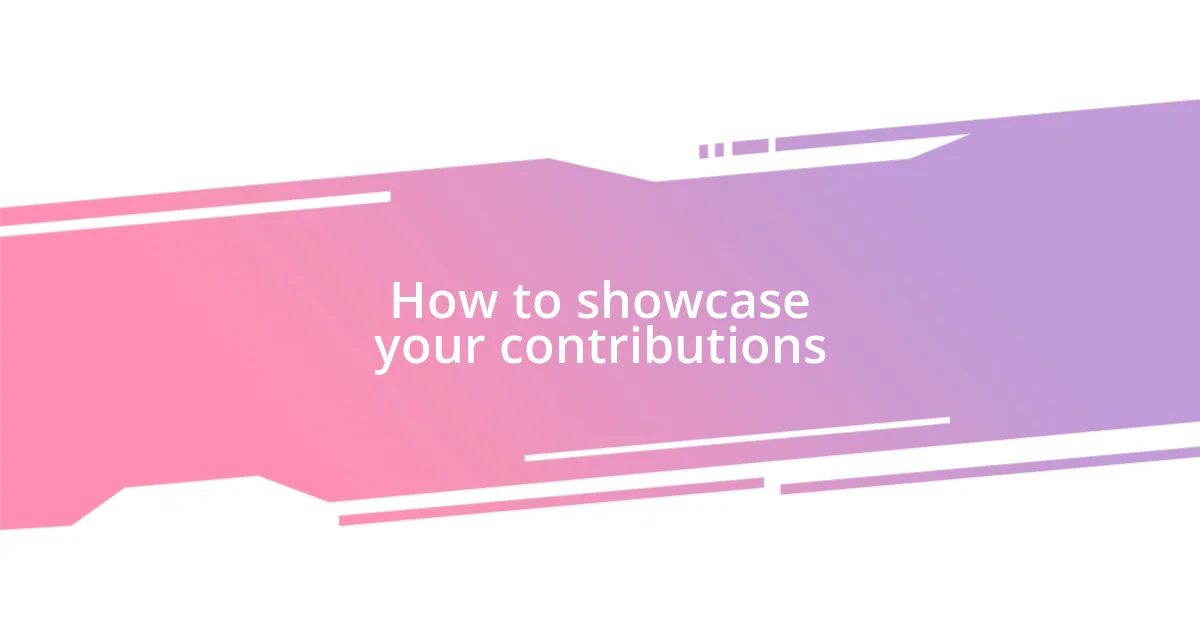
How to showcase your contributions
Showcasing your contributions to open-source blockchain projects is about more than just pointing to your pull requests; it’s about weaving your story into the fabric of the project. I love using my GitHub profile as a portfolio to display my contributions. When I first organized my repositories, I felt a sense of pride seeing my work highlighted in my profile readme. It’s like creating a digital showcase that tells others: “Here’s what I’ve built and the problems I’ve tackled.” Have you thought about how your profile can tell a story about your journey in the blockchain space?
Another effective way I share my contributions is through writing blog posts or tutorials. I remember the thrill of writing my first tutorial on integrating smart contracts; it was exhilarating to simplify complex topics for others. Not only did it clarify my own understanding, but it also positioned me as a resource within the community. By helping others, I’ve noticed it deepens my connections with fellow developers. Have you ever considered how sharing your knowledge can amplify the impact of your contributions?
I also make it a point to engage on social media platforms like Twitter and LinkedIn. One day, I tweeted about a code snippet that solved a particularly tricky issue in a project I was working on. The response was overwhelming—developers started sharing their insights and experiences. This kind of interaction not only highlights my contributions but also illustrates my commitment to collaboration. How often do you share your progress online? Engaging with the community in this way turns your contributions into conversations, and that’s where real growth happens.
